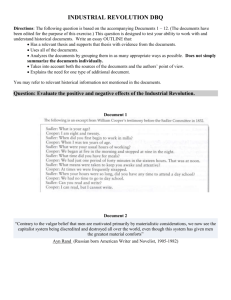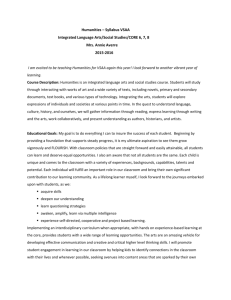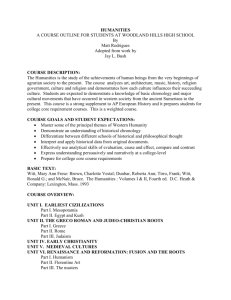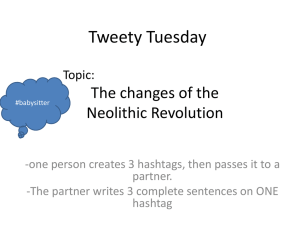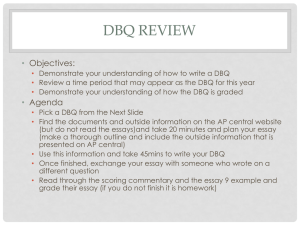Global 4 Syllabus Page 1 230 East 105th Street Kevin McCarthy
advertisement
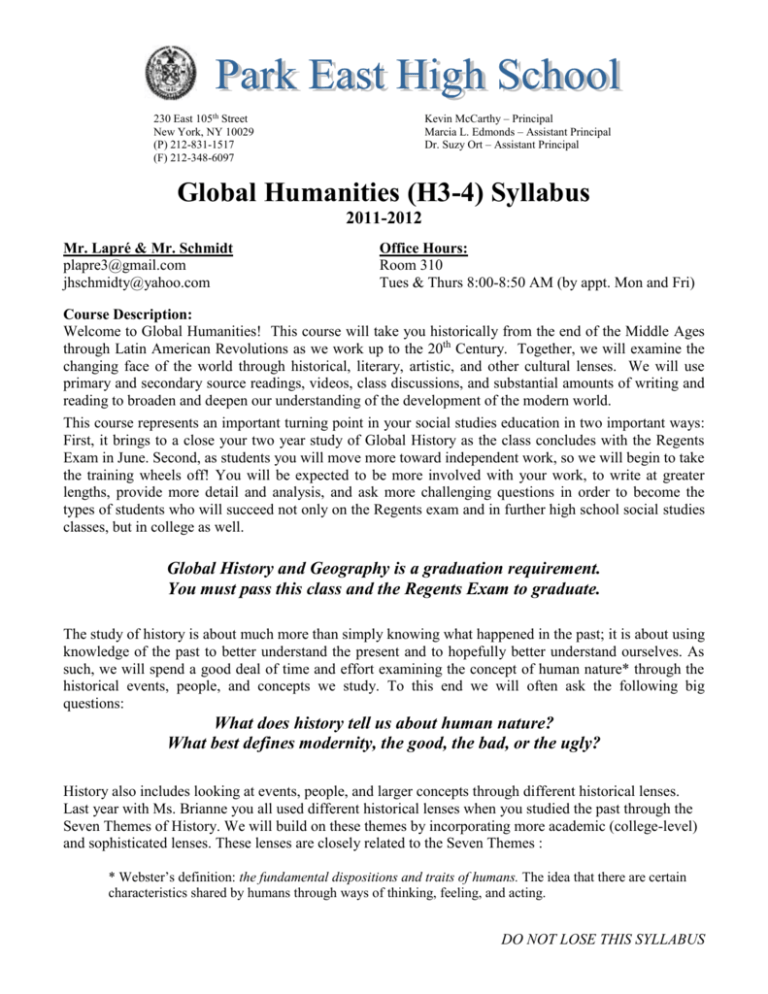
Kevin McCarthy – Principal Marcia L. Edmonds – Assistant Principal Dr. Suzy Ort – Assistant Principal 230 East 105th Street New York, NY 10029 (P) 212-831-1517 (F) 212-348-6097 Global Humanities (H3-4) Syllabus 2011-2012 Mr. Lapré & Mr. Schmidt plapre3@gmail.com jhschmidty@yahoo.com Office Hours: Room 310 Tues & Thurs 8:00-8:50 AM (by appt. Mon and Fri) Course Description: Welcome to Global Humanities! This course will take you historically from the end of the Middle Ages through Latin American Revolutions as we work up to the 20th Century. Together, we will examine the changing face of the world through historical, literary, artistic, and other cultural lenses. We will use primary and secondary source readings, videos, class discussions, and substantial amounts of writing and reading to broaden and deepen our understanding of the development of the modern world. This course represents an important turning point in your social studies education in two important ways: First, it brings to a close your two year study of Global History as the class concludes with the Regents Exam in June. Second, as students you will move more toward independent work, so we will begin to take the training wheels off! You will be expected to be more involved with your work, to write at greater lengths, provide more detail and analysis, and ask more challenging questions in order to become the types of students who will succeed not only on the Regents exam and in further high school social studies classes, but in college as well. Global History and Geography is a graduation requirement. You must pass this class and the Regents Exam to graduate. The study of history is about much more than simply knowing what happened in the past; it is about using knowledge of the past to better understand the present and to hopefully better understand ourselves. As such, we will spend a good deal of time and effort examining the concept of human nature* through the historical events, people, and concepts we study. To this end we will often ask the following big questions: What does history tell us about human nature? What best defines modernity, the good, the bad, or the ugly? History also includes looking at events, people, and larger concepts through different historical lenses. Last year with Ms. Brianne you all used different historical lenses when you studied the past through the Seven Themes of History. We will build on these themes by incorporating more academic (college-level) and sophisticated lenses. These lenses are closely related to the Seven Themes : * Webster’s definition: the fundamental dispositions and traits of humans. The idea that there are certain characteristics shared by humans through ways of thinking, feeling, and acting. DO NOT LOSE THIS SYLLABUS Global Humanities Syllabus Page 2 Seven Themes of History Seven Lenses of this Course Belief Systems Artistic/ Literary Conflict Modern Warfare Economics Environmentalism Geography Geographic Determinism Government Democracy & Rights Social Structure Class Conflict Technology Progress & Modernity Questions How does a society’s beliefs impact its culture? Where do you draw the line in modern warfare? How do issues of resource allotment and scarcity impact civilization? How does geography determine the fates of nations? What should the relationship be between the government and the governed? Do the differences between the social classes and social structure lead to historical change? Does technological innovation ensure human progress? Course Outline: Throughout the course of the semester we will cover the following topics, complete the following assignments, and answer the following big questions related to human nature and the rise of modernity: ***First Semester*** Marking Period 1 1. An overview of all of history through the study of China (September 8th – 28th) Big Question: Why did the West Triumph over the East? Will the East Triumph again? Major Assignment: History Burger Timeline of Chinese History with Powerpoint Presentation. 2. Middle Ages and Crusades (October 3rd – 7th) Big Question: Review from last year: Were the Dark Ages truly dark? Major Assignment: Review from last year: Vocabulary/ Homework Packet 3. Age of Exploration (October 11th – 21st) Big Questions: Is it human nature to embrace conflict before peace? Were the intentions of Spanish colonization of New Spain more benevolent or malevolent? Major Assignment: DBQ (5 pages) -----------------------------------------------------------------------Marking Period 2 4. Renaissance (October 24th – November 4th) Big Question: Are humans inquisitive by nature? Major Assignment: Living DBQ on Renaissance, Scientific Revolution, and Reformation (5-7 pages) 5. Scientific Revolution (November 7th – 15th) Big Question: What does the conflict between faith/ tradition and science/ experimentation say about human nature? Major Assignment: Living DBQ on Renaissance, Scientific Revolution, and Reformation (5-7 pages) 6. Reformation (November 16th – November 22nd) Big Question: Is it human nature to fight change and reform? Major Assignment: Living DBQ on Renaissance, Scientific Revolution, and Reformation (5-7 pages) 7. Age of Absolutism (November 28th – December 2nd) Big Question: Is it human nature for one leader to rise to the top? Major Assignment: Midterm (Learning how to study and choosing your technique) Global Humanities Syllabus Page 3 Marking Period 3 8. Enlightenment and the Age of Reason (December 5th – December 16th) Big Questions: What is human nature? Are humans innately good or bad? Major Assignment: Thematic Essay that build context for next DBQ 9. French Revolution (December 19th – 23rd, & January 3rd-6th) Big Questions: To what extent did the French Revolution realize the goals set forth by the ideologies of the Enlightenment? Considering the events of the French Revolution, who was right about human nature, John Locke or Thomas Hobbes? Major Assignment: Who was Right? DBQ (6-8 pages) 10. Haitian Revolution and other Latin American Revolutions (January 9th – 13th) Big Question: How does the Haitian Revolution help to define our view of modern democracy? Major Assignment: Reverse DBQ and the art of Jacob Lawrence 11. H3 Review and Final Major Assignment: Personalized Study Guide (continuing choosing your own technique) -----------------------------------------------------------------------***Second Semester*** Marking Period 1: 12. Industrial Revolution (February 1st – 10th) Big Question: Which economic system best meets the needs of humans based on their nature? Did the industrial revolution create a more positive or more negative modern world? Major Assignment: Factory field trip: Letters from the Assembly Line 13. Imperialism & Decolonization (February 13th – March 2nd) Big Question: Is it justifiable for one group of people to dominate and exploit another? Major Assignment: How-to Imperialize Handbook and corresponding DBQ 14. World War I (March 5th – 9th) Human Nature: What is the value of a human life? Does it change during times of war? Can war be worth it in the modern era? Major Assignment: Letters from the Trenches ------------------------------------------------------------------------Marking Period 2: 15. Russian Revolution & Animal Farm by George Orwell (March 12th – 30th) Big Question: Can man truly share all of the toys? What is the best way to govern and lead people in the modern world? Major Assignment: Animal Farm and the Russian Revolution 16. Interwar Period and the Rise of the Totalitarian States (April 2nd – 20th) Big Question: What is man’s place in the modern world? How does the beginning of the 20th century define what is modern/ failure thereof. Major Assignment: Interwar Art: Surrealism and the new human condition 17. World War II (April 23rd – 27th) Big Question: Total war: Where do you draw the line? What best defines WWI, the good, the bad or the ugly? Major Assignment: Create your own political cartoon/ propaganda Global Humanities Syllabus Page 4 18. Post War Realignment: Nuremburg Trials, The UN, and the Creation of Israel (April 30th - May 11th) Big Question: Can the world govern itself and/or protect against human nature? Is there room for everyone in the modern world? Major Assignment: TBD ------------------------------------------------------------------------Marking Period 3: 19. Cold War (May 14th – 18th) Big Question: Why do humans argue about the side of the bread they butter? How does ideology shape our view of the modern world? Major Assignment: Timed Writing of Regents-style DBQ and Thematic Essay 20. Ethnic Conflict: Gandhi, Mao, Mandela, and the Rwandan Genocide (May 21st - June 1st) Big Question: What are individuals capable of? What best defines the modern world, the good, the bad, or the ugly? Major Assignment: Thematic Essays (4 Pages) on Individuals and their Impact on History. 21. Regents Review How does all of history answer our questions of human nature and modernity? Major Assignments: Picture Timeline – Group Project completed in and out of class Thematic Essay Packet – A plan/ outline of every possible thematic essay Required Texts: 1. Animal Farm by George Orwell 2. Global Humanities Course Reader Behavioral Expectations: 1. Respect yourselves, your peers, your teachers, the other adults in the building, and the property around you. 2. Wear your uniform; it is a school requirement that you have your uniform on in full every day. 3. One voice policy is always in effect. Do not speak to anyone, for any reason without asking. 4. Passes –Do not ask if it is not imperative; use the restroom and do your other business before or after class. 5. We will dismiss you, not the bell. You will be the last one to leave the room if you choose otherwise. 6. No food or drink is allowed in the classroom, excepting water. 7. No cell phones, iPods, or other electronic devices are allowed in the classroom. Consider this your 1st and only warning. If we see them for a first offense, we will take them for the remainder of the period. For further offenses, we will confiscate them for the remainder of the day. 8. You must clean up. You will not be dismissed if the room is messy. 9. Request help immediately when unsure, lost, or need more practice with the material presented. This is what office hours and extra opportunities to meet are for! Academic Expectations: Over the course of this year you will practice note taking, writing, methods of historical inquiry, primary source analysis, and many other skills essential to the study of history. The following is expected of you: Class Preparedness - You must be prepared for class everyday. You must be on time, with your course reader, and in your seat when the bell rings with: Writing utensil. Paper or notebook (pencil or black/blue ink) Planner Classwork & Homework – Classwork and homework based off of classwork (not finished in class) will be randomly collected a few times each week. In addition to these regular assignments, homework packets will be assigned every week on Monday and will be due the following Friday. The homework packets are designed to build vocabulary and help with Regents preparation. This work will not be covered in depth in class and will be a big part of tests and quizzes. Worth 20% of your grade, not doing these will significantly hurt your overall grade. Major Assignments - will be assigned with advanced notice each marking period. The papers, thematic essays, DBQs, and other projects will be completed at home with limited time in-class. The requirements and grading breakdown for each will be given out in full detail well before the final due date. For a preview of these assignments view the course outline section. Quizzes & Tests - You will be quizzed on vocabulary and content from the homework packets. Tests will be given after the completion of major units. Both quizzes and tests will have a combination of multiple choice, fill-in-the-blank, short answer, and essay questions. Grading Policy: Absences: If you are absent you are expected to make up the work from that day. You may e-mail us at plapre3@gmail.com or jhschmidty@yahoo.com and ask for the work. If you are unable to, you must come to the next available day office hours: Tuesday & Thursday (and by appointment Monday & Friday) from 8:10 to 9:00. All major assignments are due on the due date and points will be taken off if you are absent unless you have an excused absence. Grade Breakdown for Marking Period: 30% - Papers/ Projects 30% - Tests/ Quizzes 20% - Homework Packets Final Exam: 10% - Classwork/ Homework 10% - Participation At the end of this semester you will sit for a three (3) hour final exam based on our work throughout the semester. Final Grade: The semester grade will be an average of the 3 (three) marking periods and the final exam. MP 1 – 25% MP2 – 25% MP3 – 25% Final Exam – 25% Academic Integrity Statement: The principles of academic integrity are a cornerstone upon which our community rests. In order to maintain academic integrity, PEHS requires that all work be entirely the result of one’s own effort. Plagiarism, cheating, or other forms of academic dishonesty will not be tolerated in any form. Final Note: For this course, you are expected to perform at a high level in terms of effort, learning, and accomplishment. Please realize that we would not have these expectations if we did not believe in each and every one of your abilities and if we were not prepared to give as much individual support as is needed outside of class. Still, the responsibility comes down to you; it’s time to be up to the task! It is our hope that you will walk away from this course not only with a greater understanding of history but also with the skills and behavioral practices that will allow you to succeed during the rest of your high school experience and beyond. Not only will this course help you complete graduation requirements, it will also provide you with the foundation to continue your education beyond these walls and well into college. Again, if you have any questions or problems, please come see us during our office hours or contact us by email to schedule an appointment. DO NOT LOSE THIS SYLLABUS Global 4 Syllabus Page 6 Kevin McCarthy – Principal Marcia L. Edmonds – Assistant Principal Dr. Suzy Ort – Assistant Principal 230 East 105th Street New York, NY 10029 (P) 212-831-1517 (F) 212-348-6097 Global Humanities (H3-4) Syllabus 2011-2012 Lapré & Schmidt I have read and understand the syllabus and rules for Mr. Lapré & Mr. Schmidt’s Global Humanities course. I will do my best to abide by them. I understand that passing this course and the Global Regents Exam is a graduation requirement. I also understand that if there are any problems that may occur during the school year, I can talk with Mr. Lapré or Mr. Schmidt during his office hours (Tuesday & Thursday from 8:10 to 9:00), after-school, through e-mail, or by phone. ________________________________________________ Student Name (print) ________________ Period ________________________________________________ Student Signature ________________ Date Dear Parent or Guardian: Our names are Peter Lapré and Joe Schmidt, and we will be your child’s Global Humanities teachers. Please review our course syllabus with your child. As a reminder, passing Global History and the Regents Exam at the end of the year are graduation requirements. If you have any questions throughout the remainder of the year please feel free to contact us at 212-831-1517 or email us at plapre3@gmail.com or jhschmidty@yahoo.com. _________________________________________________ Parent or Guardian Name (Print) _________________________________________________ Parent or Guardian Signature _________________________________________________ Phone Number _________________________________________________ E-mail (optional) _________________________ Date
